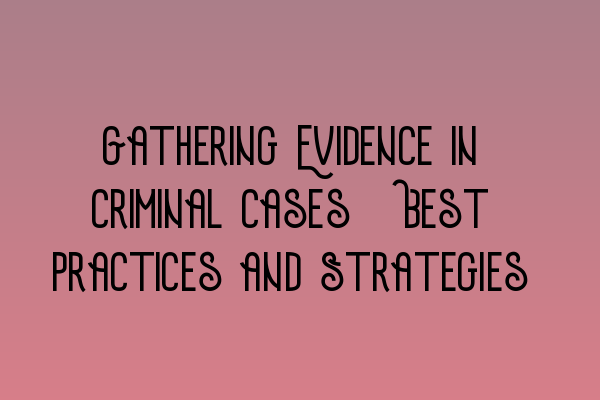Gathering Evidence in Criminal Cases: Best Practices and Strategies
Welcome to the SQE Criminal Law & Practice Law UK blog! In this article, we will discuss the best practices and strategies for gathering evidence in criminal cases. As solicitors, it is crucial to have a thorough understanding of the process and ensure that the evidence collected is admissible in court.
1. Determine the Relevance of the Evidence
Before gathering evidence, it is essential to identify the relevant information that will support your case. This includes witness statements, CCTV footage, forensic reports, and any other material that can contribute to the defense or prosecution. Ensuring that the evidence is directly related to the specific charges will strengthen your argument.
2. Conduct a Comprehensive Investigation
To gather evidence effectively, a comprehensive investigation is necessary. This involves interviewing witnesses, collecting physical evidence, reviewing documents, and analyzing any available data. By exploring all avenues, you can uncover crucial details that may strengthen your case or provide opportunities for cross-examination.
3. Maintain Chain of Custody
When gathering physical evidence, it is vital to maintain a strict chain of custody. This means documenting who has had control of the evidence at each stage and ensuring its integrity. The chain of custody is crucial in demonstrating that the evidence has not been tampered with and maintains its admissibility in court.
4. Adhere to Legal and Ethical Standards
As a solicitor, it is essential to adhere to legal and ethical standards when gathering evidence. This includes obtaining evidence lawfully, respecting the privacy rights of individuals, and ensuring that any information collected is accurate and reliable. By upholding these standards, you can safeguard the admissibility and credibility of the evidence.
5. Utilize Technology and Expertise
Advancements in technology have revolutionized the way evidence is gathered in criminal cases. Utilize digital forensic tools, surveillance systems, and expert witnesses to enhance the quality and reliability of the evidence collected. By leveraging technology and expertise, you can present a robust and compelling case.
6. Document and Organize Evidence
An organized and well-documented approach to evidence is crucial in criminal cases. Ensure that all evidence is properly labeled, indexed, and stored securely. This allows for easy retrieval when preparing for trial and strengthens the overall presentation of your case.
7. Collaborate with Experts and Colleagues
Collaboration with experts and colleagues can provide valuable insights and perspectives when gathering evidence. Consult forensic experts, investigators, and fellow solicitors to ensure that all aspects of the case are thoroughly examined. By harnessing collective knowledge, you can enhance your strategy and strengthen your case.
Conclusion
Gathering evidence in criminal cases requires careful planning, meticulous attention to detail, and adherence to legal and ethical standards. By following best practices and implementing effective strategies, solicitors can gather evidence that is both admissible and compelling. Remember to always evaluate the relevance of the evidence, conduct thorough investigations, maintain chain of custody, adhere to legal and ethical standards, utilize technology and expertise, document and organize evidence, and collaborate with experts and colleagues.
For further resources and information on preparing for the SQE exams, please check out our related articles below:
- SQE 1 Practice Exam Questions
- SQE 1 Practice Mocks FLK1 FLK2
- SQE 2 Preparation Courses
- SQE 1 Preparation Courses
- SRA SQE Exam Dates
